BOB DYLAN AND WOODY GUTHRIE: IN THE GRAND CANYON
AT SUNDOWN (Part One)
Extracts: (FULL TEXT HERE)
I Ain’t Got No Home is a very angry protest song that dramatises the plight of an itinerant worker during the Great Depression. It does not stint at criticising the authorities. The chorus runs …Police make it hard, wherever I may go… Dylan thoroughly inhabits the persona of the dispossessed narrator as he attacks the song with venom, making sure every word is heard. This is partly possible because amplification has improved considerably since the ’66 tour. The dominant instrument is Manuel’s piano. Robbie Robertson plays a fluid guitar solo towards the end and the song concludes with another stirring harmonic flourish which emphasises the singer’s desperation.
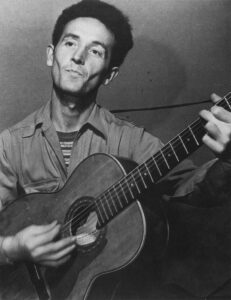
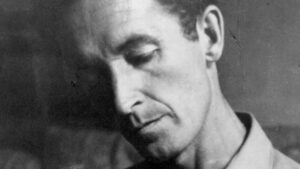
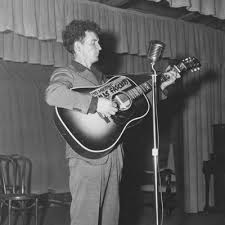
WOODY GUTHRIE
Dear Mrs. Roosevelt is the most surprising selection. This extraordinary tribute to the late American President was never recorded by its author. It pretends to be one of the many letters that members of the public wrote to Eleanor Roosevelt, perhaps the most politically active First Lady, who had campaigned actively against racism and poverty. She was also a devotee of folk music and thus perhaps a ‘fan’ of Guthrie himself. The song is a kind of love letter to the President who – despite being ‘struck down by the fever’ of polio – guided the US through World War Two and whose New Deal economic policy is said to have helped America recover from the Great Depression. Dylan treats the song with absolute sincerity. He sings more melodically here, pacing himself carefully, with The Band again supporting him on the chorus: …This world was lucky to see him born!…
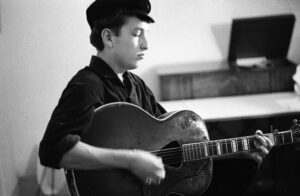
YOUNG BOB
Song to Woody is one of just two Dylan compositions on his first album, released in 1962. He is described on the sleeve notes as a ‘country blues’ singer. The rest of the material on this incendiary debut tends to confirm this. The album features ‘hard blues’ in the form of Blind Lemon Jefferson’s See That My Grave is Kept Clean, Bukka White’s Fixin’ to Die, Blind Willie Johnson’s In My Time of Dying and Curtis Jones’ Highway 51. There are also more light hearted blues-flavoured songs such as Eric Von Schmidt’s Baby, Let Me Follow You Down, Jesse Fuller’s You’re No Good and the ‘hillbilly blues’ number Freight Train Blues – along with spirited takes on traditional American folk songs like The House of the Rising Sun, Pretty Peggy-O, Gospel Plow and Man of Constant Sorrow.
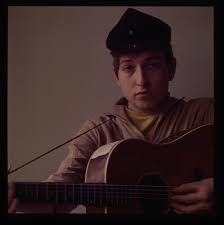
It is perhaps surprising that no Woody Guthrie covers appear on the album. But Dylan’s own Talkin’ New York uses the ‘talking’ blues’ format that Woody popularised to give a jaunty account of his own arrival in New York City in the icy cold winter of the previous year. …I froze right to the bone… he tell us. Then, borrowing a little from Chuck Berry, after a …rockin’ , rollin’ reelin’ ride… he lands in the place that he deliberately mispronounces as …Green-wich village… Already he sounds quite cynical about attitudes to ‘folk music’ in the coffee houses as he gets turned down by one proprietor: …You sound like a hillbilly. We want folk singers here… implying that he is expected to play the then-popular commercial and often bowdlerised form of the music which had brought some success to groups like The Kingston Trio. ‘Hillbilly’ music was a popular name for country and western, which the proprietor appears to be implying, is not ‘real’ folk music.
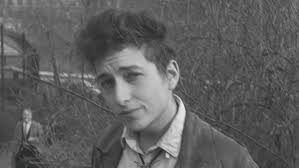
‘A DOLLAR A DAY…’
Dylan then describes how he gets a job playing harmonica for …a dollar a day… In the penultimate verse he explains how he finally gets a better paid job in a larger venue, having …joined the union and paid my dues… This is a nod to Guthrie, who was a lifelong committed socialist. The following lines do not mention Woody by name, referring to him as ‘a very great man’ who once said that …Some people rob you with a fountain pen… This is a direct reference to Pretty Boy Floyd, one of the many Guthrie songs Dylan had been performing in the clubs. Talkin’ New York could hardly be called a ‘protest’ song but already Dylan has taken on Guthrie’s satirical tone, laced with cutting humorous asides. He relates a similar tale in Hard Times in New York Town (unreleased until 1991) in which he refers to the …mighty many people all millin’ all around/ They’ll kick you when you’re up and knock you when you’re down…
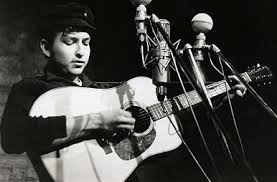
In these songs Dylan adopts elements of his mentor’s biography. Talkin’ New York begins …Ramblin’ outa the Wild West/ Leavin’ the towns I love the best… In Hard Times in New York Town he refers to … the smog in Cal-i-for-ne-ay/ ’N’ every bit of dust in the Oklahoma plains/ ’N’ the dirt in the caves of the Rocky Mountain mines… as if he himself has lived a life of ‘rambling’ like his hero. In his first ever radio interview with Oscar Brand in October 1961 he deliberately embellished this entirely mythical life story:
Bob Dylan I was raised in Gallup, New Mexico.
Oscar Brand Do you get many songs there?
Bob Dylan You get a lot of cowboy songs there. Indian songs. That vaudeville kind of stuff.
Oscar Brand Where’d you get your carnival songs from?
Bob Dylan Uh, people in the carnival…
Oscar Brand Do you travel with it or watch the carnival?
Bob Dylan Travel the carnival when I was about 13 years old.
Oscar Brand For how long?
Bob Dylan All the way up till I was 19 every year off and on I’d join different carnivals.


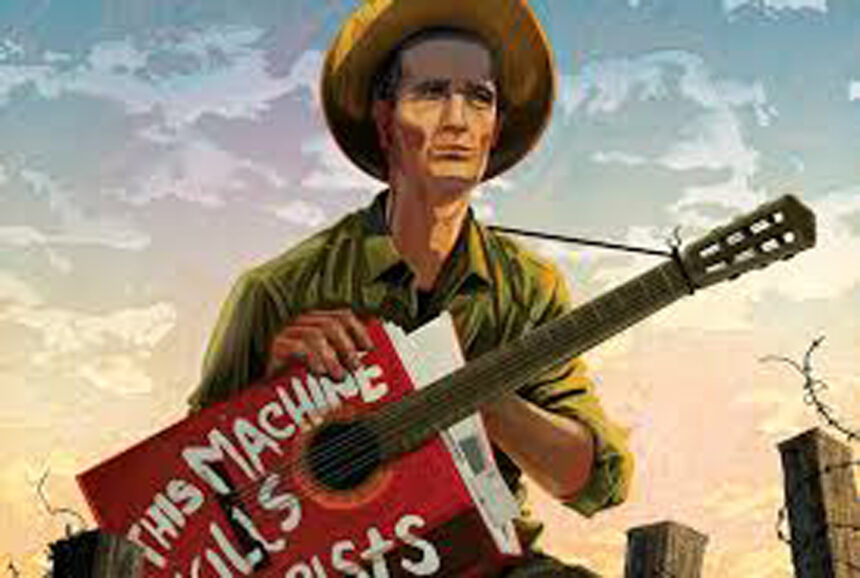
Leave a Reply